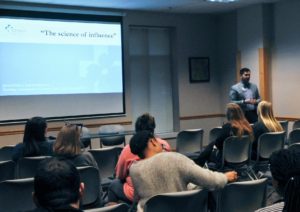This story was co-written with Haley Smith.
Western Carolina University’s Communication Department is offering a new health communication concentration for current and prospective students.
The new concentration will accompany the current broadcasting, broadcast sales, journalism and public relations concentrations for communication majors.

Heath Nettles speaks to interested students and faculty about the demands of health communication. Photo by Jeffery Neufeld.
The department’s website defines the new concentration as, “A program that focuses on how people, individually and collectively, understand and accommodate to health and illness and the role of communication and media in shaping professional health care messages and public acceptance of these messages.”
Health communication students will learn about conveying health-related or care-related messages, promoting health care, maintaining relationships, social structures and more.
Heath Nettles, the director of digital and social media in the Marketing and Communications Division of Mission Health Systems, visited campus on Feb. 27 to help kick-off the new concentration.
About 20 students and faculty attended Nettles’ presentation about his experience in health communication. Mission Health was ranked 23rd out of 800 hospitals in 2014 for social media-friendly hospitals and is listed in the top 100 health blogs.
He offered advice to students seeking employment in the field after graduation – advising students to take classes in marketing, coding and research to better prepare for the demands of the field.
“I thought Heath portrayed an entirely new approach to health care and the importance of putting patients first,” said Mandy McDuffie, a communication student with a concentration in public relations. “I hope to do something similar in Fayetteville when I start working after I graduate.”
Nettles said Mission Health is looking to the future and finding ways to change the climate and dynamic of healthcare. For example, calling patients by their name rather than “the patient.”
He also discussed how best to handle complaints in the health industry using the acronym LAST – listen, apologize, satisfy and thank. Communication officials should listen to the individual’s complaint, apologize for their experience, satisfy their needs by looking further into their situation and thank them for bringing it to their attention.
In the past few years, more and more healthcare providers have begun to offer online portals to medical records, online pay and many other features; however, Nettles said virtual care is now the next new step. He said this type of care is not very far off in the future.
The eight-semester plan for health communication students can be found on the department’s website.



